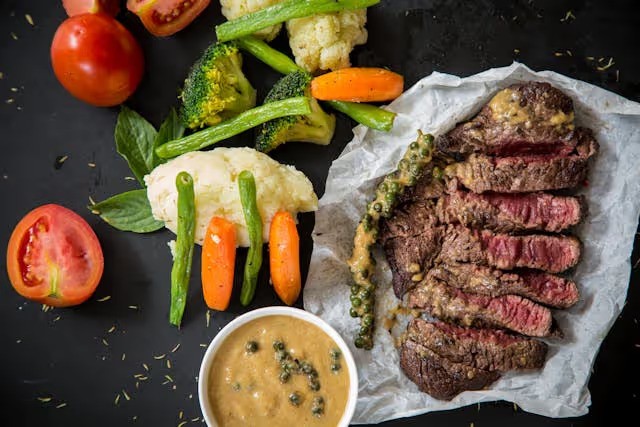Understanding Gout and Dietary Triggers
To effectively manage gout, it is important to understand the condition and its relationship with dietary triggers. This section provides an overview of gout and the role that diet plays in its development.
What is Gout?
Gout is a form of arthritis characterized by intense pain, swelling, and stiffness in the joints. It occurs when uric acid levels in the blood become elevated, leading to the formation of urate crystals in the joints. These crystals trigger an inflammatory response, causing the symptoms associated with gout.
Typically, gout affects the joints in the lower extremities, such as the big toe, ankle, and knee. The pain can be sudden and severe, often accompanied by redness and warmth in the affected area.
Role of Diet in Gout Development
Diet plays a significant role in the development and management of gout. Certain foods and beverages can increase the production or hinder the elimination of uric acid, leading to elevated levels in the bloodstream. This can contribute to the formation of urate crystals and the onset of gout symptoms.
To minimize the risk of gout attacks, it is important to understand the dietary factors that can trigger or exacerbate the condition. These triggers often include foods high in purines, a compound that the body breaks down into uric acid. By limiting the intake of purine-rich foods and making healthier dietary choices, individuals with gout can help reduce the frequency and severity of gout attacks.
The following section will discuss specific foods and beverages that should be limited to prevent gout, as well as those that are high in purines and can increase the risk of gout development. Through a balanced approach to diet and lifestyle choices, individuals can effectively manage gout and improve their overall quality of life.
Foods to Limit for Gout Prevention
When it comes to preventing gout, making dietary changes is essential. Certain foods have been identified as triggers for gout attacks or can increase the risk of developing gout. Among these foods, red meat, seafood, and sugary beverages are particularly important to limit.
Red Meat
Red meat, such as beef, lamb, and pork, can be problematic for individuals with gout. These meats are high in purines, which are naturally occurring compounds that can contribute to the production of uric acid in the body. Excessive consumption of red meat can lead to elevated levels of uric acid, increasing the risk of gout attacks.

If you enjoy red meat, consider moderating your consumption and opting for leaner cuts. Additionally, incorporating other sources of protein, such as poultry, tofu, or legumes, can help diversify your diet and reduce the risk of gout.
Seafood
Seafood, including shellfish and certain fish varieties, is another group of foods that individuals with gout should limit. Some seafood options, such as anchovies, sardines, mussels, and scallops, are high in purines. These purines can contribute to the production of uric acid, potentially triggering gout attacks.

If you enjoy seafood, it’s advisable to consume these options in moderation. Opting for seafood with lower purine content, such as salmon or shrimp, can be a safer choice for individuals with gout.
Sugary Beverages
Sugary beverages, including soda, fruit juices with added sugars, and sweetened iced teas, can also contribute to gout risk. These drinks are high in fructose, which has been associated with elevated levels of uric acid. Consuming excessive amounts of sugary beverages can increase the likelihood of gout attacks.
It’s important to be mindful of the hidden sugars in various beverages. Opting for water, herbal tea, or unsweetened drinks can help reduce the intake of added sugars and lower the risk of gout.
By limiting the consumption of red meat, seafood, and sugary beverages, individuals with gout can take proactive steps in preventing gout attacks and managing their condition. Remember to consult with a healthcare professional or a registered dietitian for personalized dietary recommendations to effectively manage gout and maintain overall health.
Foods High in Purines
When it comes to managing gout, it is important to be mindful of foods that are high in purines. Purines are natural substances found in certain foods that can contribute to the production of uric acid in the body. Excessive uric acid levels can lead to the formation of urate crystals, triggering gout attacks. In this section, we will explore three common culprits: organ meats, alcohol, and processed foods.
Organ Meats
Organ meats, such as liver, kidney, and sweetbreads, have high purine content and should be limited in a gout-friendly diet. These meats are not only rich in purines but also tend to have higher fat content, which can further exacerbate gout symptoms.
It is essential to note that cooking methods can affect the purine content of organ meats. Grilling or broiling organ meats can increase the formation of purine compounds, so it is advisable to opt for alternative cooking methods that involve lower heat and decreased cooking times.

Alcohol
Alcohol consumption is strongly associated with an increased risk of gout. Alcoholic beverages, especially beer, are known to be high in purines and can raise uric acid levels in the body. Moreover, alcohol can also impair the kidneys’ ability to remove uric acid from the bloodstream, further contributing to gout development and flares.
It is advisable for individuals with gout to limit or avoid alcohol consumption. If you choose to drink, it is best to opt for lower-purine options such as moderate amounts of wine or spirits.

Processed Foods
Processed foods are often culprits in many dietary concerns, and gout is no exception. These foods, including deli meats, sausages, and pre-packaged snacks, tend to be high in purines and can contribute to elevated uric acid levels. Additionally, processed foods often contain high levels of salt, which can further worsen gout symptoms by increasing water retention and uric acid concentration.
It is recommended to limit the consumption of processed foods and opt for fresh, whole foods instead. By choosing a diet rich in fruits, vegetables, whole grains, lean proteins, and low-fat dairy products, you can help reduce your risk of gout flares.
Understanding the impact of organ meats, alcohol, and processed foods on gout risk is crucial for managing the condition through dietary choices. By making informed decisions and adopting a balanced approach to your eating habits, you can help minimize the risk of gout flares and promote overall well-being. It is always advisable to consult with a healthcare professional or registered dietitian for personalized dietary recommendations based on your specific needs.
5 Foods That Can Increase Gout Risk
When it comes to managing gout, it’s important to be aware of certain foods that can increase the risk of gout flare-ups. By limiting or avoiding these trigger foods, individuals with gout can better control their symptoms and reduce the frequency of painful attacks. Here are five common culprits that can increase gout risk:
Beer
Beer, in particular, has been associated with an increased risk of gout. This is primarily due to its high purine content and the way it affects purine metabolism in the body. Purines are natural compounds that are broken down into uric acid, and elevated levels of uric acid can lead to gout.

Sugary Drinks
Sugary drinks, including soda and fruit juices with added sugars, have been linked to an increased risk of gout. These beverages contribute to weight gain and obesity, which are associated with higher uric acid levels. Moreover, fructose, a type of sugar commonly found in sugary drinks, can also raise uric acid levels and exacerbate gout symptoms.

Organ Meats
Organ meats, such as liver, kidney, and sweetbreads, are high in purines and should be limited or avoided by individuals with gout. These meats contain higher levels of purines compared to other types of meat, which can lead to an increase in uric acid production and gout flare-ups.

Shellfish
Certain types of shellfish, including shrimp, lobster, and crab, have moderate to high purine content. Consuming these foods can contribute to uric acid buildup and trigger gout attacks. While it’s not necessary to completely eliminate shellfish from the diet, individuals with gout should consume them in moderation.

Processed Foods
Processed foods, such as fast food, packaged snacks, and pre-packaged meals, often contain high levels of purines and unhealthy additives. These foods can contribute to weight gain and inflammation, both of which can worsen gout symptoms. It’s advisable to limit the consumption of these processed options and opt for healthier, whole food alternatives.
By being mindful of these trigger foods and making healthier dietary choices, individuals with gout can better manage their condition and reduce the frequency and severity of gout attacks. It’s important to remember that everyone’s triggers may vary, so it’s best to work with a healthcare professional to develop a personalized diet plan that suits your specific needs.
Managing Gout Through Diet
While dietary choices play a significant role in managing gout, it’s crucial to adopt certain strategies to minimize the risk of gout attacks. This section explores three key aspects of managing gout through diet: the importance of hydration, a balanced diet approach, and the importance of consulting a healthcare professional.
Importance of Hydration
Staying adequately hydrated is essential for individuals with gout. Drinking enough water helps to flush out uric acid from the body, reducing the likelihood of crystal formation and gout flare-ups. It is recommended to consume at least 8 cups (64 ounces) of water per day.
Apart from water, certain beverages can also contribute to hydration. However, it’s important to be mindful of their impact on gout. Here are some hydrating options to consider:

It’s important to note that sugary drinks, such as soda and sweetened fruit juices, should be avoided or consumed in moderation due to their potential to increase gout risk.
Balanced Diet Approach
Adopting a balanced diet is key to managing gout. A well-rounded diet can help maintain a healthy weight, reduce inflammation, and minimize the risk of gout attacks. The following principles can guide your dietary choices:
- Include a variety of fruits and vegetables: These provide essential vitamins, minerals, and antioxidants that promote overall health and help reduce inflammation.
- Choose whole grains: Opt for whole grains like brown rice, quinoa, and whole wheat bread, which are rich in fiber and have a lower glycemic index compared to refined grains.
- Consume lean proteins: Replace high-purine protein sources, such as red meat and organ meats, with lean proteins like poultry, fish, and plant-based protein alternatives.
- Limit saturated and trans fats: Minimize your intake of foods high in saturated and trans fats, such as fried foods, fatty cuts of meat, and processed snacks.
- Moderate alcohol consumption: Alcohol, particularly beer and spirits, can increase the risk of gout. It’s advisable to limit alcohol intake or avoid it altogether.
Consulting a Healthcare Professional
While making dietary changes is important, it’s essential to consult a healthcare professional, such as a registered dietitian or a doctor, for personalized guidance. They can provide expert advice tailored to your specific needs, consider any underlying health conditions, and help you create a comprehensive plan to manage gout through diet.
A healthcare professional can also help you monitor your uric acid levels, assess your overall nutritional needs, and recommend any necessary modifications to your diet to ensure optimal gout management.
By prioritizing hydration, adopting a balanced diet approach, and seeking professional guidance, individuals with gout can make informed dietary choices to minimize the risk of gout attacks and improve overall well-being. Remember, consistency and long-term adherence to a healthy lifestyle are key factors in managing gout effectively.
Sources




